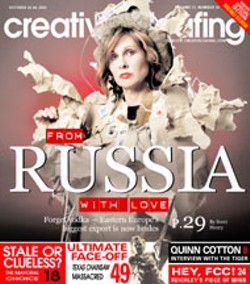For a lonely man shuffling toward middle age but still holding out hope that he'd share the rest of his life with a soulmate, Lewis realized his was not an enviable position.
"I couldn't find what I'd call a decent woman, a family woman," he says in his smalltown drawl.
So he looked east. Way east.
For four years, Lewis had been ordering catalogs from European Connections, an Atlanta company that introduces American men to Russian women. He'd scan the dozens of smiling faces and read the descriptions: "Natalya, 28, aesthetician, fond of travel, seeks husband who is generous and has sense of humor. . ."
Lewis had written to several of the women he found in the catalog on an on-and-off basis. A correspondence might peter out, he'd get busy with work, maybe he'd go out on a date with a local woman, but he'd always return to the Slavic beauties in the pages of the catalog.
In 1999, after four years of daydreams and procrastination, he signed up for a "romance tour." Previous European Connections clients, whom he spent long hours calling for advice, told him that a country boy like himself should avoid the snobby big-city girls of Moscow and St. Petersburg. Instead, he should look for love in Ukraine, where things are less complicated and people are accustomed to a slower pace.
That fall, he and 50 other guys touched down in Kiev for 10 whirlwind days of speed-courting. The first three days would be spent attending "socials" in the ballroom of their four-star hotel, through which hundreds of splashily dressed Ukrainian women would be herded over the course of tightly organized meet-and-greets lasting up to five hours.
Each man was assigned his own interpreter and instructed to talk to as many women as possible, never lingering for more than 20 minutes on any one girl. Get a phone number if you like her, tell her you'll call her that evening to make a date, then move on to the next girl.
Take detailed notes, and shoot a Polaroid, Lewis was told, because once the adrenaline rush of the introductions is over, you'll never be able to remember who you've met.
Each girl wears a tag with a clearly printed number, which initially is more useful than her name. To add to the men's confusion, there seem to be only about three dozen names in common rotation among Russians; entire states could be populated exclusively by Svetlanas, Ludmilas and Tatyanas.
When Lewis, dressed in a coat and tie and accompanied by his interpreter, Julia, walked through the ballroom door, he was stunned by the wealth of feminine pulchritude on display within.
"It was everything I'd been told and more," he says.
It's fortunate there was such a large selection of women, because Lewis had some very exacting ideas about who he was looking for. Besides being pleasing to the eye, she should be a smalltown girl, somewhere between 28 and 32 years old. A teacher or engineer was preferred; Lewis' research had shown that those were low-paying professions that nonetheless demanded a strong education. A teacher, he reasoned, would be less likely to be a gold digger.
Finally, he was looking for a woman who had a child. He already had two sons and didn't want to father any more kids. His bride-to-be wouldn't feel she had missed out on motherhood, he figured, if she already had a child of her own. Ideally, that child would be a daughter.
The first afternoon, Lewis met dozens of women and ended the social with a handful of numbers, but without feeling as if he'd met the one person he'd come to Ukraine to find.
But he seemed to be in the minority. Many of his fellow travelers left the reception smitten with one or more of the Annas or Irinas they'd met. Others were clearly hung up on their interpreters.
The next day, as Lewis entered the reception hall, he decided to make a careful survey of the room before plunging into conversation. Between the groups of women clustered around the Americans, he spotted a pretty blonde sitting by herself near the wall; she looked shy, perhaps a little melancholy.
"How old do you suppose she is?" he asked Julia, who said she thought probably early 20s.
"Oh, that's too bad. . ." Lewis said, thinking of his checklist criteria. Then, as the blonde peered forlornly about the room, he reconsidered.
"Well, I guess it wouldn't hurt to talk to her," he said. "See if she'd like to meet me."
He watched as Julia walked over and spoke to the girl, pointing back at Lewis. The girl looked up at him, smiled, nodded and began making her way across the ballroom.
Looking for a pre-feminist femme
Guys who've been beaten down by the dating wars. Workaholics whose career success has come at the expense of their social lives. Lonely divorced men who can't face a return to the bar scene. These are Art Steckel's customers.
As the founder of European Connections, he used to listen patiently as men would rationalize their going overseas to search for brides. "I've heard a thousand reasons," Steckel says. "Over and over again."
Now 11 years old, European Connections is one of the leaders of an unregulated industry that has grown to include hundreds of mail-order-bride agencies, most with at least one website and many with affiliate offices in Russia.
A 1999 report by the INS (since reborn as the Bureau of Citizenship and Immigration Services under the Department of Homeland Security) estimates that "international matchmaking organizations" were responsible for helping bring approximately 5,000 Russian brides into the US annually. That number continued to rise until the clampdown on visas that followed 9-11.
For the past decade, the mail-order bride industry has been dominated by a handful of major stateside players, including Steckel's company. Other prominent firms include A Foreign Affair in Phoenix, AZ, probably the biggest and best-known agency; the Houston-based Angelika network, which has sold dozens of "franchise" websites that share its database of available women; and Anastasia, run by a former mail-order bride out of Bangor, ME.
According to Steckel, his clients are mostly white-collar: doctors, lawyers, accountants and a surprising number of airline pilots. The limited research that's been done on the industry bears him out; the INS study confirms that the typical mail-order bride customer is about 40, white, well-educated, conservative and professionally successful.
Of course, a man must be reasonably well-off to afford the $3,500 that European Connections charges for a romance tour, not to mention the costs of bringing a woman into the US.
But the most striking commonality among the men who keep this industry afloat is a pre-feminist concept of marriage and family that has led them to believe that, in order to find a girl just like the girl who married dear old dad, they've got to leave the US of A.
Many American men feel burned by failed marriages, disillusioned with career women and intimidated by the demands of their female contemporaries. These men are looking for a return to an era when the man was head of the household and the woman had dinner on the table when he got home. And they're going to Ukraine to find it.
"The women over there are like they were here 50 years ago," Phil Lewis explains. "For them, their family comes first. They appreciate what they've got more than American women."
The customer testimonials appearing on nearly every matchmaking website hammer home this stereotype: Russian women are less materialistic than American women; they're dedicated homemakers and devoted mothers; they're not discriminating about a man's looks, but are concerned about their own appearance. In short, Slavic women are more feminine -- or least closer to an old-school feminine ideal.
Steckel concedes that the perception that American women are spoiled shop-aholics who won't give a man the time of day unless he drives a luxury car is perhaps a little unfair.
"Americans of both sexes have some unrealistic expectations in a mate," he says. "But at least a guy can jump on a plane and go realize his fantasy."
Dr. Paul Kapphahn, a psychotherapist who has counseled several Russo-American couples who'd met through a matchmaking agency, says he's familiar with this odd brand of reverse chauvinism.
"I know many men who've written off American women because they think they're too demanding or materialistic," he says. "They read about Ukrainian women who lead simple lifestyles, who don't need to be shopping all the time, who are devoted to their families, and they think, "That's the woman for me.'"
It also doesn't hurt that the former Evil Empire seems to be bursting at the seams with stone-cold hotties.
Like A Product
Sasha already had seen her share of heartache when a friend told her about the dating agency. She had been married at 19 to a good-looking truck driver and they'd had a daughter. But her husband drank too much and had little interest in being a father, so she left him and moved back in with her parents in the eastern Ukrainian city of Sloviansk. She had finished college and got a job teaching Ukrainian at a local school, but yearned to find a man who needed her.
"Every normal woman dreams of a family," she says in her thick Slavic accent.
Then a friend gave her an invitation to a reception in Kiev where she could meet wealthy foreign men, and showed her the European Connections catalog.
"I said, I'm 23 and putting myself in a catalog like a product? I don't think so," she recalls.
But her younger sister talked her into making the trip to the capital. After all, it sounded better than meeting someone at a bar. Plus, if she felt uncomfortable, she could just leave.
So Sasha joined her friend on the train to Kiev and found herself in the ballroom of a fancy downtown hotel, sitting by herself as her friend mingled with the foreign men.
"I saw many beautiful girls and I thought, what am I doing here?" she says. She was about to leave when she was told a man had asked to meet her.
Phil Lewis was the first American she had ever met. Even though she spoke no English, the two found they had a great deal in common.
"In only a few minutes, he showed me pictures of his children -- and usually men don't care about children," Sasha says.
After about 15 minutes of translated conversation, she says, "I felt at home. I looked in his eyes and I know nothing can go wrong."
They left the reception and spent the rest of the evening getting to know each other, with the interpreter's help. Lewis was able to brush aside his concern that she was too young.
The next morning, Phil invited her to visit him in the US and the two filled out an application for a fiancee visa. If things worked out between them, they agreed, they'd get married in America and make a home for her daughter, Lena.
"I wasn't happy with my life, but I had never before thought of leaving Ukraine," Sasha says.
She had to return to work, but later that week, he came to visit her in Sloviansk for an afternoon.
"Her family was very nice, real down-to-earth," says Lewis, who enrolled Sasha in local English classes while they waited for her visa to come through. A few months later, in the spring of 2000, they were married.
While a couple can meet and even pursue a courtship over the Internet, they must show proof that they've met face-to-face in order to obtain a fiancee visa. And, in the end, it's the woman's decision whether to leave her country for an older foreign man she may barely know. In the former Soviet Union, where an estimated one-third of the population lives in poverty and jobs are scarce, it's become a popular option for many young women. Especially since there's a common perception that Western men are more sensitive and supportive than Russian men. Sasha's friend who accompanied her to the Kiev social is now married to a man in South Carolina, she says. Some of her friends back in Ukraine would ask her how they, too, could meet American husbands.
Which is how Lewis became inspired to start his own Russian dating agency. He spent $6,500 to buy a website from Angelika, which gives him access to its database of more than 15,000 women.
Like other sites, his "Jewels of Russia" contains a brief profile listing the woman's age, height, weight, hometown, education level, languages spoken and other vitals. Most sites contain a few comments from the woman; a few are crass enough to list her measurements.
Some of the information may seem mildly dubious -- since when do so few European women smoke or drink? -- or gently manipulated for a Western audience -- most women assert they're Christian, but few specify Russian Orthodox. Those quibbles aside, much of the data seems reliable enough, as when a profile indicates that a woman speaks poor English or has children from a previous marriage.
The website is strictly a side venture for Lewis, who is a partner in an auto-repair business. He estimates that he spends a few hours a week on the phone answering customer queries about what it's like to marry a Russian woman.
"I enjoy talking about the subject and giving out free advice," he says.
He earns a cut every time a client orders a woman's contact information for $10, or requests to have a letter translated for $15. Sometimes, Sasha will act as interpreter on three-way phone calls, for which she charges $2 a minute.
Customers can also pay to have flowers, candy or perfume delivered to a woman by one of Angelika's local affiliates in Russia. If such items were sent by mail from the US, Lewis says, they would likely be stolen and sold by corrupt postal workers. He even makes travel and lodging arrangements for men looking to visit Russia.
"As long as American women keep acting the way they do, this business will be OK," he says, laughing.
A Way Out
At age 61, Art Steckel is tall, probably 6 feet 2 inches, and somewhat gaunt, but has energy to burn when talking about his niche industry. Wearing oversized, tinted glasses indoors, he dresses casually at the office, in jeans and a T-shirt. His conversation is studded with flat declarations that have the ring of a sales pitch.
"No matter who you are and what your drawbacks, your expectations can be much higher with Russian women," he exclaims.
Steckel's joviality seems somewhat at odds with his purported background. An Atlanta native, he says he learned Russian while working in Europe for the National Security Agency, the ultra-secret intelligence agency whose operatives are forbidden to discuss their duties.
In 1989, after entering civilian life and having sold a successful business in California, Steckel was traveling in the Soviet Union when he came across the office of a state-run, local dating agency.
Looking at the photos posted on the wall, he says, "I was amazed by the number of beautiful women. I thought, American guys would really go for this."
Asking if these women might also be interested in foreign men, he was told, Da, da. He bought 1,000 of the women's files for $1 apiece from the delighted agency bureaucrats.
Two years later, when the Soviet Union fell apart, European Connections was born.
"It started big and has only grown," Steckel boasts. After a year of building up his client base, he launched his proudest creation, the romance tour. Before tourism fell off on account of 9-11 and the deflating economy, he estimates his company took 1,000 men a year on trips to Moscow, St. Petersburg, Odessa and Kiev.
The idea is simple: Three days of receptions are followed by a week of sightseeing and organized events during which the men have the chance to get to know the women they've met at the socials.
Steckel allows that seeing 400 women in one afternoon can be a bit overwhelming, but when it's a life partner you're looking for, better to have too many choices than too few.
Often his biggest challenge, he confides, is persuading the men not to limit their opportunities.
"It's a constant battle to protect the client from himself," Steckel says, shaking his head. "I tell guys all the time: Don't fall in love with a photograph, don't pick an interpreter you're attracted to, don't go off with the first pretty girl you meet, leave the engagement rings at home -- but they sometimes just ignore us."
Then there are the women who are simply looking for a ticket out of Russia and plan to dump their husbands after two years of marriage, when they become eligible for permanent resident status.
"Many of these women are looking to get into the country any way they can," says Bureau of Citizenship and Immigration Services spokesman Garrison Courtney, who added that some immigrant women accuse their new husbands of domestic abuse, which can automatically entitle them to a provisional green card. But he admits that the bureau has no statistics to determine how common this is.
There's no doubt, however, that the biggest risks in these relationships are faced by the women, who are leaving behind their families and their support network to come to a place where they don't know the language and often don't know their husbands.
"The profile of the average guy who's using this service is someone who's not able to relate to local women," says Donna Hughes, professor of Women's Studies at the University of Rhode Island and one of the few academics who has spent any time investigating the mail-order bride industry.
"Many of these guys are control freaks and some are abusive," she says. One of the main reasons that men are drawn to much-younger, less-sophisticated women is the Pygmalion impulse, the desire to tell the woman what she needs to know and teach her how to act, she says.
Also, because the woman is in the US under the man's sponsorship, he can hold her immigration status over her head to make her do what he wants, Hughes adds.
On the other hand, she admits that there is little solid evidence to show that mail-order brides are abused any more than the average. Preliminary data by the INS indicates that 80 percent of marriages between an American man and a foreign wife are still intact, versus a 50-percent divorce rate for the general populace, although there's no prevailing theory as to why this might be.
"No one's really studied it enough," Hughes says. "There are no statistics."
But there are a handful of horror stories, the best-known being that of Anastasia King, a 20-year-old mail-order bride from Kyrgyzstan whose estranged husband was convicted of her murder in Washington state in 2002. It turns out he had divorced a previous foreign bride -- who had taken out a protective order against him -- and was seeking a third at the time of the murder.
A bill authored by two Washington congressmen would require introduction agencies to look into their clients' criminal backgrounds and pass the translated information on to prospective brides.
As Steckel sees it, legitimate matchmaking companies like his offer women a viable way out of the despair and poverty that are the modern reality in the former Soviet Union, where the economy is largely controlled by organized crime.
According to Andrei Timofeev, a specialist in the Russian fiscal system at Georgia State University, jobs are hard to come by, and the average wage in small towns in Ukraine and Russia is about $30 a month, meaning many women must marry in order to afford to move out of their parents' home.
In addition, says Timofeev, because of the sexism ingrained in Russian society, Slavic women tend to be more deferential to men and less likely to challenge traditional gender roles than are many Western women.
Ultimately, even Hughes is somewhat ambivalent toward the mail-order bride industry.
"I've traveled across Ukraine and, seeing some of those villages, I can easily imagine a girl of 18 or 19 wanting to leave," she says.
It's Not Hollywood
Lying along US Highway 341 between Macon and Brunswick, GA, the small town of Baxley, with a population just topping 4,000, relies on three main industries: lumber, tobacco and Plant Hatch, a nuclear-power facility overlooking the Altahama River just north of the city limits.
The Appling County seat, Baxley is home to a technical college and even a Japanese steakhouse, but its most exotic feature seems to be Sasha Lewis. That's sometimes the way it feels to the only Russian within a 50-mile radius. Such as a few weeks ago when a redneck local overheard her accent and asked, "So, how much did yer husband pay for yew?"
She just began a new job as a teacher's aide at the local elementary school, but hopes eventually to work her way up to teaching ESL classes on her own. She now calls Baxley "a good place to raise children," but it didn't always feel like home.
"I knew America only through the movies, but South Georgia isn't Hollywood and this isn't the life I thought it would be," explains Sasha, who comes across as thoughtful and self-assured.
When she first arrived, she didn't know enough English to talk to her stepchildren. Alone all day while Phil was at the auto shop, she spent hours on the phone talking to a network of other Russian girls who'd moved to the US, asking them how they coped.
"For the first year, I didn't know if I could make it," she says. She gradually became more aware of the gap in their ages, their cultural differences, their conflicting habits.
"If we didn't have such strong feelings for each other, it wouldn't have worked," she says.
Sasha says she realizes she was too naive when she got married; she wasn't prepared for the abrupt changes of moving from a city of 100,000, where she was surrounded by her family and childhood friends, to a town in rural Georgia where she could barely speak the language. Baxley has no decent library, she says, no movie theater, no shopping center.
"I now tell other girls, don't get married just to leave Ukraine, you'll be miserable," she says. "I think 90 percent of Ukrainian girls are unhappy over here -- they get married for the wrong reason. I know lots of girls who could barely last two years before they got divorced."
Couples counselor Kapphahn says he can often spot the marriages that have no chance.
"The determining factor seems to be how much time the two have spent together beforehand," he says. "I've known people who, within a week of meeting, had a wedding ceremony. Those are the ones who didn't make it."
The appeal of bringing home a pretty young thing is certainly universal, but not without its risks, Kapphahn points out.
"The bigger the gulf in ages, the harder to make it work, especially in these relationships," he says. "Pretty soon, she's getting attention from younger guys and thinking, "Why am I with this old guy with the beer belly?'"
Other marriages fell apart because the husband wouldn't allow the wife to socialize with other Russians.
"It can make all the difference in the world for her to have that community support, but some American men view that as a threat," he says.
When Sasha gets homesick for things Russian, she and Phil load into the car with Lena, now nearly 7, and drive to a small Russian grocery store two hours away in northern Florida. There she can buy sausages, pickles and wine that remind her of home.
She also manages to visit her family about once a year. This spring, she returned to Sloviansk for six weeks, taking Lena to see her grandparents' home for the first time. She cherished her time there, but Sasha says she now feels like Baxley is home.
"I came to this small town, where there are no other Russians, so I had to become an American," she says.
Latest in Cover
More by Scott Henry
-

Post-election coping
Nov 10, 2004 -

Zell's Final Zag
Sep 15, 2004 -

Damn Spam!
Jul 16, 2003 - More »
Calendar
-

Wine & Paint @ Blackfinn Ameripub- Ballantyne
-

Face to Face Foundation Gala @ The Revelry North End
-
An Evening With Phil Rosenthal Of "Somebody Feed Phil" @ Knight Theater
-
Kountry Wayne: The King Of Hearts Tour @ Ovens Auditorium
-

Queen Charlotte Fair @ Route 29 Pavilion
-
Esports in Charlotte Takes Off: A Guide to Virtual Competitions and Betting
-
Canuck in the Queen City 7
A Canadian transplant looks back at her first year as a Charlotte resident
-
Homer's night on the town 41
If you drank a shot with the Knights mascot on Sept. 20, you were basically harboring a fugitive












